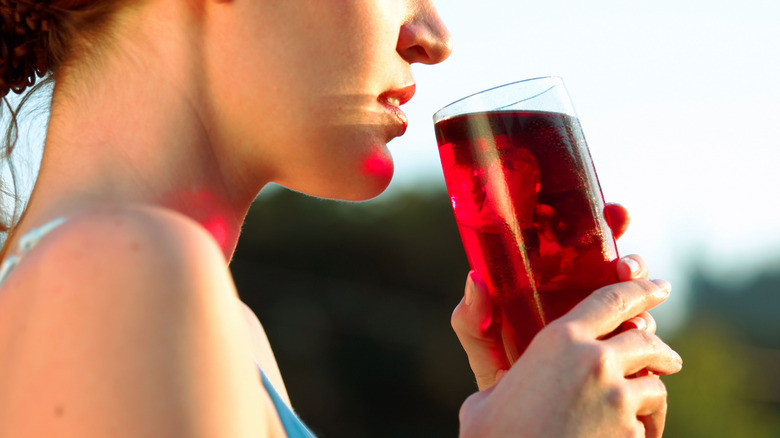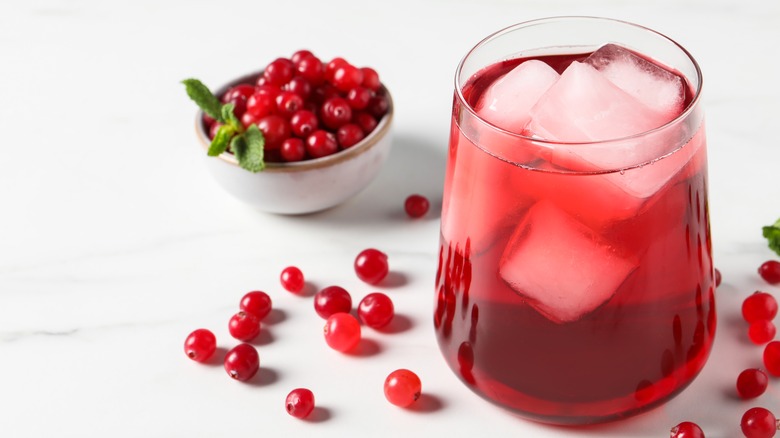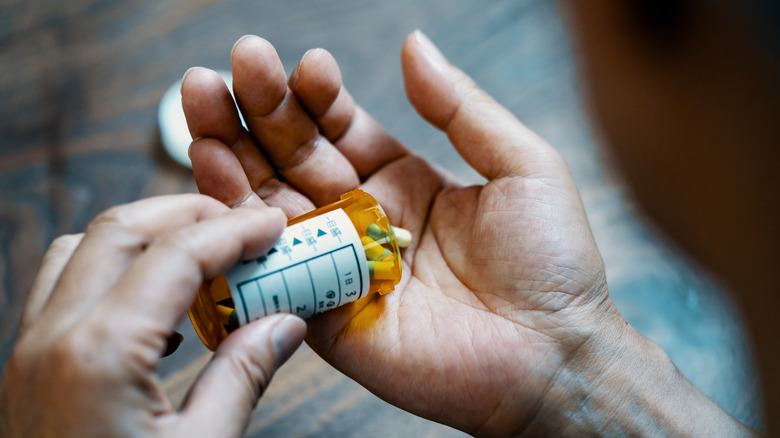What To Know About Drinking Cranberry Juice With Warfarin
Cranberry juice is well-known for preventing urinary tract infections, but you'll also find other health benefits. The 24 milligrams of vitamin C, 3 milligrams of vitamin E, and flavonoids protect your body from free radicals to ward off disease. The A-type proanthocyanidins in cranberry juice might also fight the harmful gut bacteria to improve your gut microbiome. Anthocyanins keep plaque from building up in your arteries that could lead to high blood pressure.
There are a few things to keep in mind if you like cranberry juice and you're also taking the common blood thinner warfarin. If you've heard that cranberry can negatively interact with warfarin, you my be concerned enough to avoid it completely — however, it may not be as big of a risk if you're careful about the amount you drink. Of note, "... cranberry juice contains vitamin K, which can potentially counteract warfarin's effects," Dr. Jason Singh, Chief Medical Officer and Physician at One Oak Medical, explained in an exclusive Health Digest interview. "An increase in vitamin K intake can lead to a decrease in warfarin's anticoagulant effect."
A cup of unsweetened cranberry juice has 13 micrograms of vitamin K, which is 11% of your daily value. Vitamin K is important in helping your blood clot to limit excessive bleeding, and other fruits and vegetables such as kiwifruit, plantains, beet greens, and spinach are high in vitamin K. But Singh says it's not just vitamin K in cranberry juice that could be a potential issue if you're drinking liters of the tart juice every day.
Certain flavonoids in cranberries can boost warfarin's effect
Flavonoids are plant-based antioxidants that fight off everyday stressors in your body and reduce inflammation. While you want these flavonoids in your diet, you'll want to be careful if you're taking warfarin. "Some flavonoids in cranberries, particularly quercetin, can inhibit a specific type of enzyme," Dr. Jason Singh said. "This enzyme is responsible for metabolizing warfarin in the liver. Inhibition can lead to increased warfarin levels in the blood, potentially enhancing its anticoagulant effect."
Singh says that the interaction of quercetin and warfarin could lead to side effects such as bleeding and bruising, but it also could render warfarin ineffective. That could lead to a risk of blood clots. "The severity can vary depending on several factors, including the amount of cranberry juice consumed, the individual's warfarin dose, and their overall health status," he stated.
Small amounts of cranberry juice, such as 1 to 2 glasses a day, have not been shown to negatively interact with warfarin's performance, according to Singh, and there is no longer a warning about cranberry consumption on the warfarin information distributed by pharmacies (via FDA). You might want to steer clear of cranberry supplements or massive amounts of cranberry juice if you're trying to manage a UTI while also taking warfarin (btw, cranberry juice doesn't treat a UTI).
The bottom line? A 2013 article in the Journal of Pharmacy and Pharmaceutical Sciences said that drinking 1 to 2 liters of cranberry juice a day (which is a lot!) or taking cranberry supplements for more than three or four weeks can affect the effectiveness of warfarin.
Manage your food and supplement intake while taking warfarin
While you don't have to give up drinking cranberry juice if you're taking warfarin, Drugs.com suggests keeping your vitamin K intake consistent. In other words, if you already were drinking a glass of cranberry juice a day before you were prescribed warfarin, you should be fine. However, you don't want to start taking a multivitamin that has vitamin K in it unless you check with your doctor. You also don't want to suddenly eat more fruits and vegetables high in vitamin K once you start taking warfarin.
Warfarin has 147 major interactions with drugs, alcohol, and food, according to Drugs.com. A glass or two won't significantly affect the effectiveness of warfarin, but drinking more than that could potentially cause an issue. You could also see a risk of bleeding if you take warfarin with fish oil, vitamin E, steroids, or nonsteroidal anti-inflammatory drugs. Talk to your doctor if you're taking supplements such as flaxseed, psyllium fiber, kava kava, or red yeast rice for their potential interaction with warfarin.



